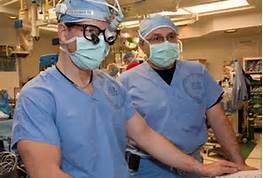 ORTHOPEDIC RESIDENTS TRAINED DIFFERENTLY THAN NEURO RESIDENTS IN SPINE? WHAT? (Orthopedics This Week)
ORTHOPEDIC RESIDENTS TRAINED DIFFERENTLY THAN NEURO RESIDENTS IN SPINE? WHAT? (Orthopedics This Week)
Confusion in the Ranks: Variability in Spine Training Amongst Orthopedic and Neurosurgery Residents
Alan Daniels, M.D., an orthopedic surgeon at Brown University, isn’t comfortable with the variability that currently exists in residency training for spine surgeons. He tells OTW, “As opposed to, say, otolaryngologists or urologists, who have only one training pathway, spine surgery specialists have two. There are both orthopedic surgery residency and the neurosurgical residency pathways, each with their own strengths and weaknesses for training spine surgeons. Orthopedic trainees who specialize in spine surgery follow residency with a dedicated spine fellowship, whereas neurosurgery trainees often go directly to performing spine surgeries after residency. What makes this situation problematic is that some residency programs provide inadequate spine training. There is so much variability in the training for spine surgeons, and a lack of standards outlining adequate training for spine surgeons. This leads to a situation where some surgeons may be inadequately trained, and patients and other medical professionals become confused about the capabilities and areas of expertise of surgeons who perform spinal surgery in their communities.”
“To study spine surgeon training, my colleagues and I performed a study in which we assessed the Accreditation Council for Graduate Medical Education (ACGME) case logs of graduating orthopedic and neurosurgery residents from 2009 to 2012. We went into this knowing that orthopedic residents generally perform fewer spinal procedures than neurosurgery residents, however, we desired to explore the trends in spine training between and within each specialty. The average number of reported spine surgery procedures performed during orthopedic residency was 160; for neurosurgery surgery it was 375 procedures. It was not only the number of cases which differed between the specialties, but also the types of cases performed. We found a significant difference in the average number of spinal deformity procedures between graduating orthopedic surgery residents (9.5) and graduating neurosurgery residents (2.0). Also, we found that orthopedic residents do a higher proportion of instrumentation and fusion procedures compared to neurosurgery residents, who participated in proportionally more decompression procedures.”
“We also found a tremendous variability in spine exposure within the specialty. We examined the bottom 10% and the top 10% of graduates for spinal instrumentation or arthrodesis procedures, i.e., those who did the fewest and the most procedures. We found a 13-fold difference for orthopedic surgery residents and an 8.3-fold difference for neurosurgery residents. This is concerning because the neurosurgery trainees in the bottom 10% are still going out and doing spine surgery independently, and with no additional training. In orthopedics, these trainees are likely poorly prepared for fellowship, and may or may not be adequately trained following spine fellowship.”
“One of the overarching issues is the ACGME accreditation for spine fellowships is currently voluntary and uncommon amongst spine fellowships. It is debatable whether ACGME accreditation improves fellowship training in any way; however, it is clear that there is little oversight of spine fellowships in both orthopedic and neurosurgery spine fellowships. This is problematic due to the fact that there is clearly variability in residency training for spine surgeons, and thus if this same variability exists among spine fellowships, some spine trainees may be inadequately trained to perform independent spine surgery at the conclusion of training. It is clear that we should monitor this problem closely, and we may wish to consider spine surgeon specialty certification. One important way to improve spine surgeon training would be to create a 3rd training pathway consisting of categorical spine surgery residency training which would decrease variability in training and allow for a focused and deliberate spine training experience. Although this is extremely controversial, spine surgery has clearly grown into a complex and complete medical and surgical field in recent years, and carefully considering the future of spine surgeon training is overdue.”

 The Orthopedics Industry
The Orthopedics Industry